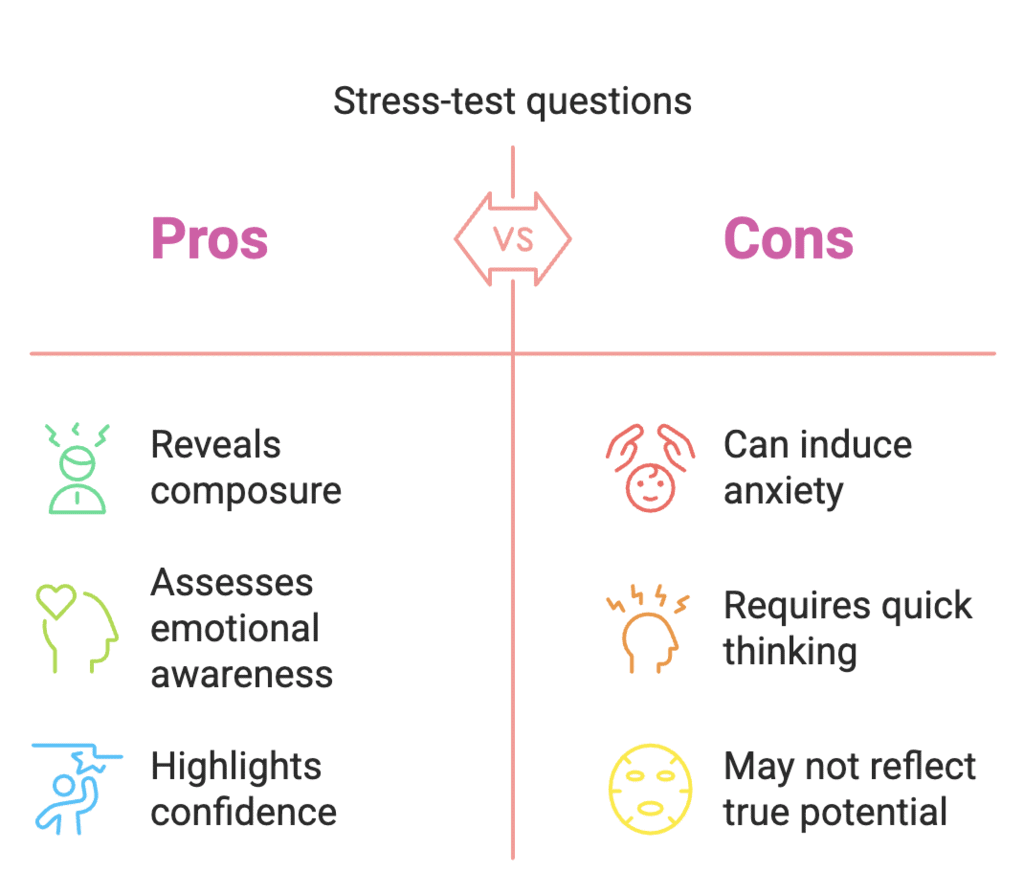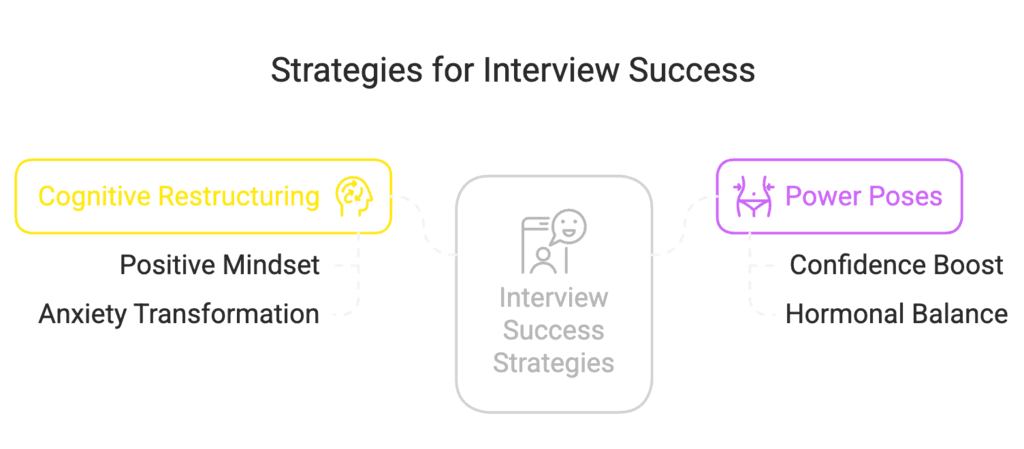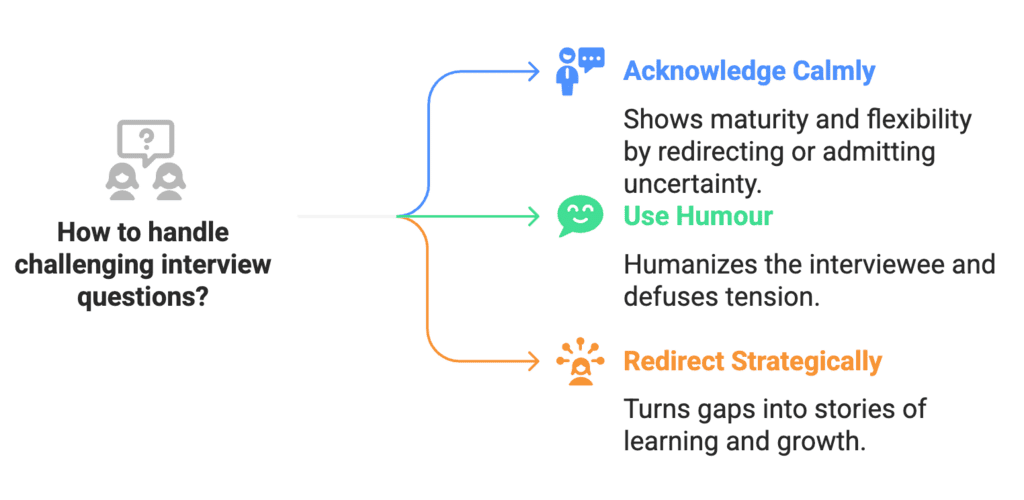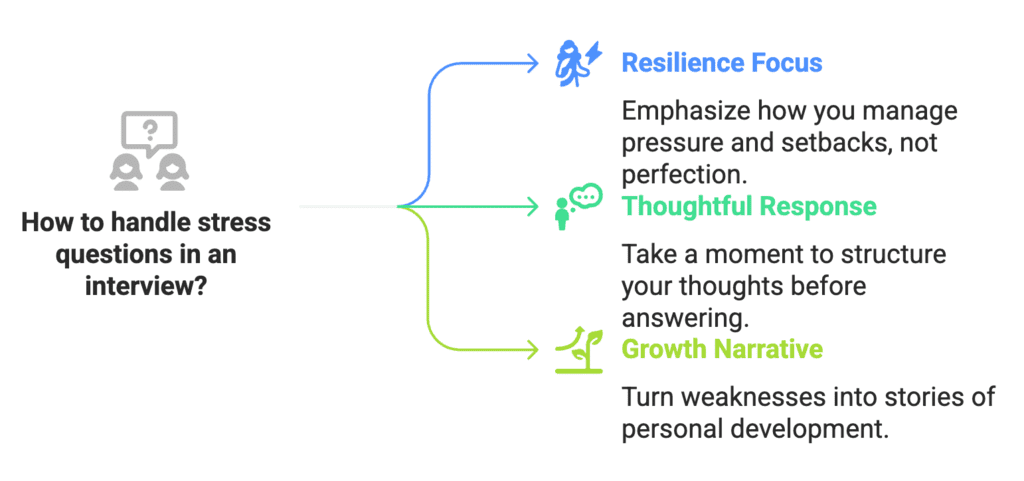Mastering Stress and Tricky Questions in CAT Interviews: Staying Calm Under Pressure | CAT Interview Preparation Guide PDF Download
CAT interviews often include tough, stress-test questions that are meant to check how you think under pressure and how emotionally aware you are. These aren’t just about what you say — they reveal how calmly and confidently you can respond when the stakes feel high.
You might hear things like:
“You seem overconfident. Why should we admit you?”
“Your academics are weak. How will you handle rigorous coursework?”
“What if we reject you today?”
Such questions can throw you off if you’re not prepared. But how you respond matters just as much as what you say. Staying composed in these moments is what sets confident candidates apart from the rest.

Preparation Tips
- Mock Interviews:
Practice with peers who can ask you unexpected, challenging questions. This will help you get comfortable with thinking on your feet and managing pressure in real-time. The more varied the questions, the better prepared you’ll be for anything the interviewer throws your way. - Record & Review:
Recording your mock interviews can be a game-changer. By watching yourself, you can spot nervous habits — like fidgeting, speaking too quickly, or avoiding eye contact. Once you’ve identified these tendencies, you can work on eliminating them, allowing you to respond more naturally and confidently during the real interview. - Visualisation:
Take a few moments before each interview to mentally rehearse your responses. Picture yourself handling questions with calm confidence. Visualisation is a powerful tool that prepares you emotionally, helping you stay grounded during stressful moments and making your delivery smoother.
Psychological Techniques to Stay Calm
Handling pressure starts with managing your inner state. These simple yet powerful techniques can help you stay calm, focused, and in control — whether you're waiting outside the interview room or responding to a tough question.
1. Breathing Exercises
- Box Breathing (4-4-4-4):
Inhale for 4 seconds, hold your breath for 4 seconds, exhale for 4 seconds, and pause for 4 more. This rhythmic breathing technique can quickly calm your nerves, especially in moments of rising anxiety. - Diaphragmatic Breathing:
Place a hand on your stomach and breathe deeply so your stomach expands, not your chest. This kind of breathing signals your body to relax, helping to reduce stress responses before or during the interview. - Why it works: These methods activate your parasympathetic nervous system — the part of you responsible for calm and recovery — and help prevent panic or mind blanks.
2. Reframing Negativity
- Cognitive Restructuring:
Instead of thinking “What if I mess this up?”, shift your mindset to “This is a chance to show them what I bring to the table.” This small change in thought can transform anxiety into motivation. - Example: If you're asked a difficult or challenging question, treat it not as a threat but as a platform to demonstrate your problem-solving skills and emotional control.
- Power Poses:
Try standing tall with your hands on your hips for two minutes before your interview — like a superhero. This isn’t just a confidence trick; research shows it boosts confidence hormones (testosterone) and reduces stress hormones (cortisol).

3. Mindfulness & Grounding
- 5-4-3-2-1 Technique:
When you start to feel overwhelmed, use your senses to anchor yourself in the moment. Quietly name:
5 things you can see
4 things you can feel
3 things you can hear
2 things you can smell
1 thing you can taste - When to use: If your thoughts start spiralling or your heart starts racing, this grounding exercise brings you back to the present and resets your focus.
Tackling Tricky Questions – Strategies & Examples
1. Stress-Test Question Types
| Question Type | Goal | Example |
|---|---|---|
| Self-Doubt Inducers | Test self-awareness | “Why do you think you deserve a seat here?” |
| Hypotheticals | Assess problem-solving | “How would you resolve a conflict between two teammates?” |
| Provocative | Gauge emotional control | “Your work experience is irrelevant to an MBA. Agree?” |
2. Rebuttal Strategies
Tough or confrontational questions in interviews aren’t meant to corner you — they’re designed to test how you think under pressure. By staying calm and using a blend of humility, logic, and structure, you can turn even the sharpest question into an opportunity to stand out.
Strategy 1: Stay Humble, Back with Evidence
Question: “You seem overconfident. Why should we admit you?”
How to Respond:
Start by acknowledging the concern without getting defensive.
You might say:
“I appreciate the feedback. I’m passionate about what I do, and I realise that can sometimes be perceived as overconfidence.”
Then, back it up with proof of grounded leadership:
“For instance, I led a team of 10 to raise ₹5L for a non-profit. That experience taught me how to work collaboratively while staying focused.”
Wrap up by showing a willingness to grow:
“I’m excited to learn from this community and evolve into a more empathetic and balanced leader.”
Strategy 2: Deflect with Positivity
Question: “What if we reject you today?”
How to Respond:
Stay composed and future-focused.
“I’d respect the decision, and I’d reflect on areas to improve. But I’m confident in the work I’ve put in and would certainly reapply with more perspective. That said, I do believe my experience with XYZ makes me a good fit for this program.”
Strategy 3: Use Frameworks for Hypotheticals
Question: “How would you market a pencil to a farmer?”
How to Respond:
When faced with an odd or abstract question, don’t panic. Use a framework like the 4Ps of Marketing to stay structured:
Product: Emphasise durability or dual-use (e.g., writing + measuring stick).
Price: Keep it affordable; consider bundling with farm tools.
Place: Distribute through local cooperatives or village stores.
Promotion: Use simple demonstrations or video campaigns showing its utility in daily tasks.
Graceful Recovery from Mistakes
Mistakes in interviews are common — what sets strong candidates apart is how they respond. A stumble doesn’t have to derail your performance if you recover with composure, honesty, and presence of mind.
1. Acknowledge Calmly
- If you give a wrong or unclear answer, don’t panic. A simple, confident redirect like “Let me rephrase that…” or “Another perspective could be…” shows maturity and flexibility.
- Not sure about a question? Instead of guessing, try: “I’m not certain, but here’s how I’d approach it…” This shows problem-solving ability rather than bluffing.
2. Use Humour (Carefully)
A touch of lightness — when appropriate — can humanise you and defuse tension.
Example:
Interviewer: “Your GPA is on the lower side.”
You: “Yes, and it taught me the importance of time management — which I’ve applied since while leading the XYZ fest and steadily improving my academics.”
3. Redirect Strategically
Turn gaps into stories of learning and growth.
Example:
Interviewer: “Why didn’t you do any internships?”
You: “I focused on building technical skills through online courses in data analytics, which I later applied to freelance projects — like the one where I helped a local business track their customer retention…”

Common Mistakes to Avoid
- Over-Rehearsing:
While preparation is key, over-rehearsing can make your answers sound robotic and lacking in authenticity. Focus on the flow of your thoughts and ideas, not memorising exact lines. Your goal is to sound natural and adaptable, not overly scripted. - Defensiveness:
Interviews are not about being combative. If you're challenged on a point, stay calm and acknowledge the interviewer’s perspective. You can say, “That’s a valid point. Here’s my perspective…” This shows maturity, self-awareness, and the ability to handle critique gracefully. - Over-Explaining:
Keep your answers concise and to the point. Aim for 1-2 minute responses that directly address the question, and avoid the temptation to over-explain or dive into unnecessary details. Focus on quality, not quantity, to keep the interview engaging and informative.
Final Checklist for Staying Calm
Practised Box Breathing Daily:
Incorporate box breathing into your routine for at least a week to ensure it's a natural way to calm yourself in high-pressure situations. This will help regulate your stress levels and keep your mind clear.Prepared 3 Stories to Pivot To:
Have 3 key stories ready — one about an achievement, one about a failure, and one about a learning experience. These will serve as go-to examples that highlight your strengths, resilience, and growth when answering tough or unexpected questions.Rehearsed Responses to 5 Stress-Test Questions:
Be prepared for challenging questions like, “What if we reject you today?” or “Why should we admit you?” Practice framing your answers with confidence, focusing on your skills and growth rather than defensiveness.Scheduled Mock Interviews with Feedback:
Mock interviews are invaluable for simulating real interview scenarios. Schedule at least 2-3 mock sessions with peers or mentors and actively seek constructive feedback. Use the feedback to refine your responses and improve your delivery.
Key Takeaways
Stress Questions Test Resilience, Not Perfection:
These questions are designed to assess how you handle pressure and setbacks. It's not about having perfect answers, but about demonstrating how you manage challenges with composure and maturity.Pause, Breathe, and Structure Your Thoughts Before Answering:
Don’t rush into answers. Take a moment to collect your thoughts, breathe deeply, and structure your response logically. This will help you stay calm and deliver a more thoughtful answer.Turn Weaknesses into Stories of Growth:
Use your weaknesses as opportunities to showcase your personal development. For example, “My low GPA taught me time management” turns a potential red flag into a story of growth and learning.

Remember: The interviewer isn’t your enemy—they want to see how you handle challenges. Stay calm, stay curious, and let your preparation shine!
|
21 videos|18 docs
|
FAQs on Mastering Stress and Tricky Questions in CAT Interviews: Staying Calm Under Pressure - CAT Interview Preparation Guide
| 1. What are some effective psychological techniques to stay calm during a CAT interview? |  |
| 2. How can I gracefully recover from mistakes made during a CAT interview? |  |
| 3. What common mistakes should I avoid when preparing for a CAT interview? |  |
| 4. What should be included in my final checklist to stay calm before the CAT interview? |  |
| 5. What are the key takeaways for mastering stress and tricky questions in CAT interviews? |  |
















